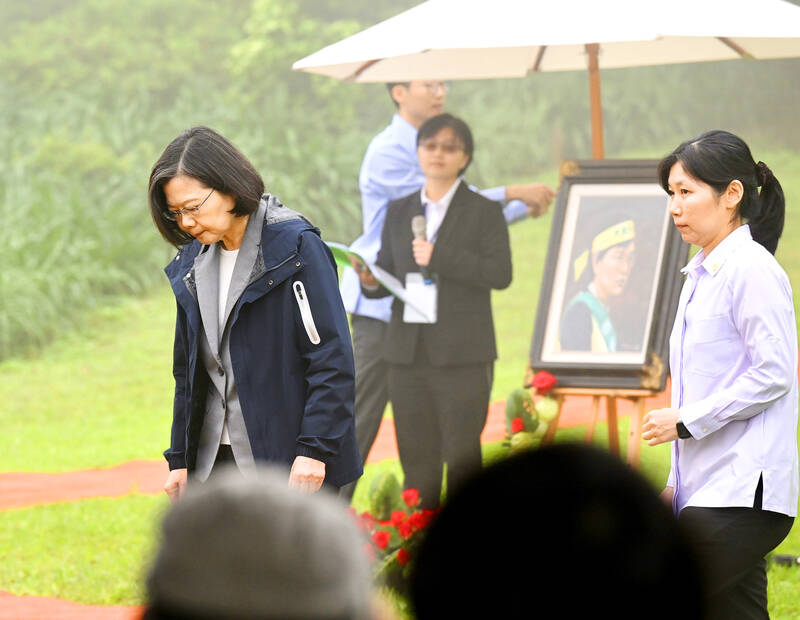The values of freedom and democracy have been embedded in Taiwanese DNA, President Tsai Ing-wen (蔡英文) said, adding that the nation would continue to stand with the alliance of democracies and be a force for good in the world.
Tsai made the remarks at a memorial commemorating the 35th anniversary of the death of democracy pioneer Deng Nan-jung (鄭南榕) in New Taipei City’s Jinbaoshan Cemetery yesterday.
Deng, who ran several dissident magazines, self-immolated on April 7, 1989 as authorities attempted to arrest him on charges of sedition.

President Tsai Ing-wen, left, attends a ceremony commemorating the 35th anniversary of the death of democracy pioneer Deng Nan-jung at his tomb in New Taipei City’s Jinbaoshan Cemetery yesterday.
Photo: Lo Pei-de, Taipei Times
In December 2016, the Tsai administration designated April 7 as Freedom of Speech Day to honor Deng’s pursuit of freedom of expression.
Freedom of Speech Day reminds Taiwanese that the nation’s freedom and democracy are the result of blood and tears shed by numerous democratic pioneers, she said yesterday.
On Saturday, president-elect William Lai (賴清德) also paid tribute to Deng by attending the opening of an exhibition about democracy activists at the National 228 Memorial Museum in Taipei.
“After Bi-khim and I take office on May 20, we will have several important tasks,” Lai said, referring to vice president-elect Hsiao Bi-khim (蕭美琴).
“The first is to firmly safeguard Taiwan’s sovereignty,” he said. “Only with democracy can there be freedom, and only with freedom can there be human rights.”
Lai added that his government is committed to upholding freedom, democracy and human rights, while advocating for transitional justice, including restoring the reputation of those who were politically persecuted during Taiwan’s authoritarian era and compensating them accordingly.
“We must not allow the unfortunate history of the past to repeat itself,” Lai added, likely referring to the era in 1945 to 1992, during which people were subject to political persecution and their civil liberties were heavily suppressed.
Apart from publishing politically critical magazines, Deng had been active in several pro-democracy demonstrations in Taiwan until the age of 41.
Although martial law was lifted in 1987, freedom of speech continued to be stifled until Article 100 of the Criminal Code, which permitted the imprisonment of people deemed by the state to be guilty of “anti-state activities,” was amended in 1992.
The exhibition, which runs through July 31, seeks to expose visitors to Deng’s lifelong “fight for 100 percent freedom” in Taiwan, amidst a rapidly changing political environment at home and abroad, the event’s curator Lee Wen-cheng (李文政) said.
In addition to numerous exhibits, among them photographs, illustrations and documents provided by more than a dozen photographers and artists, the original copies of Deng’s magazines are also being showcased, Lee said.
Source: Taipei Times - 2024/04/08




















